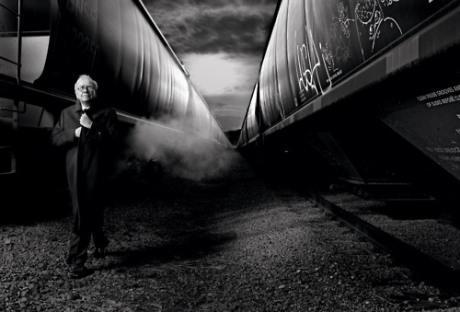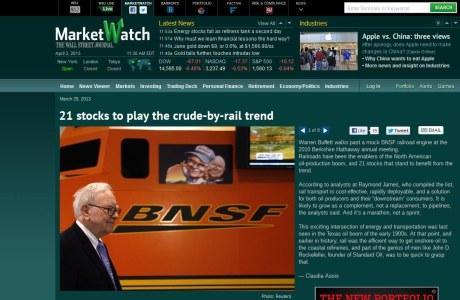Cross Posted from WrongKindofGreen
An investigative report by Cory Morningstar
Gloat Like Rockefeller When Watching Trains
March 5, 2013: Buffett Says Gloat Like Rockefeller When Watching Trains
On Nov 3, 2009, Berkshire Hathaway, the investment vehicle of Warren Buffett, announced its plan to purchase the 77.4 percent of Burlington Northern Santa Fe (BNSF) that it did not already own for $26 billion in cash and stock – the largest deal in Berkshire history. The deal, which included Berkshire’s prior investment and the assumption of $10 billion in Burlington Northern debt, brought the total value to $44 billion. Buffett remarked it was a big bet on the United States.
It was TO be a bet that both President Barack Obama and Secretary of State, Hillary Clinton, would ensure he DID not lose.
“There’s class warfare, all right, but it’s my class, the rich class, that’s making war, and we’re winning.”
– Warren Buffett
Barack Obama owes much gratitude to 350.org et al. Under this administration, grotesque atrocities and ecological devastation are accelerating around the world at an unparalleled speed – all in the name of the American people. Despite this fact, 350.org, Sierra Club, Natural Resources Defence Council, Greenpeace and friends all excel “beyond the call of duty” in painting this same regime in the clean, shiny patriotic colours of red, white and blue; glossed over in an emerald green vellum, drenched in the hope industry’s PR slogans and feel-good symbolic campaigns. In reality, 350.org and other Obama sycophants could not care less about stopping the tar sands. Hence, they wittingly draw your attention to a pipeline the industry doesn’t need.
The Show’s Over
… “[T]here are about 18 billion dollars worth of other pipeline projects that [are] totally approved, ready to go, nothing standing in their way, shovels essentially in the ground and these all will be ready by about 2015….” Nov. 8, 2012 Globe & Mail video, Canada’s pipelines: Beyond Gateway and Keystone
The proposed KXL pipeline through Montana, South Dakota and Nebraska has seemingly provoked strong opposition from environmental NGOs and activists who argue that extraction of crude oil from tar sands increases greenhouse gas emissions that cause global warming. The second highlighted point of contention is the safety of the pipelines, which are prone to spills and leaks. Yet this is a strategic public relations campaign on the part of 350.org et al: brilliantly executed misinformation by design. In the case of KXL, a design whereby the NGO frames the main objections (in this case pipeline safety) while industry quietly implements a “solution” that will be somewhat condoned by the public. Case in point: Tar sands oil pipelines (and all other pipelines) leak. They are difficult to maintain and require ongoing maintenance. Contamination of fresh water, soil and sensitive ecosystems is a very real threat and concern. The main selling feature of the rail tanker put forward by industry as a solution is that they are nearly impervious to puncture and leaks, having been designed to bounce if a trains derails. In response, the NGOS within the complex will issue little to no rebuttal, effectively signaling to the public that rail must be a safer option.
“Anthony Swift, an attorney for the Natural Resources Defense Council and co-author of one of the critical pipeline safety reports, said railroads don’t offer a feasible alternative to pipelines from Canada. He said tar sands producers aim to triple oil output by 2030, which would outstrip railroads’ capacity. But the U.S. State Department, in a report on Keystone XL issued Friday, said ‘the proven ability of rail to transport substantial quantities of crude oil profitably’ means that denial of the project ‘is unlikely to have a substantial impact on the rate of development in the oil sands, or on the amount of heavy crude oil refined in the Gulf Coast area.’
“As anti-pipeline groups have pressed the White House to kill the project, the oil and railroad industries have been building oil-loading terminals and buying tank cars to ship Canadian crude oil by rail. ‘There is no permitting required — you can put oil on rail and nobody can complain,’ said Sandy Fielden of RBN Energy, a Houston-based consulting firm that has tracked the oil-by-rail boom. In the campaign against Keystone XL, the National Wildlife Federation and other groups have issued two reports since 2011 critical of pipeline safety, singling out Canada’s heavy oil called bitumen as especially hazardous. Neither report mentioned the risks of shipping it by rail. Yet the dramatic growth of the crude-by-rail business in North America illustrates how quickly shippers can adapt to a new option. North Dakota, the nation’s No. 2 oil-producing state behind Texas, ships the majority of its oil by rail from loading terminals built mostly in the past three years.” — March 3, 2013, Canadian crude oil finds a new pathway through Minnesota [Emphasis added]
Very few in the environmental movement wish to discuss, let alone acknowledge, the very ugly reality that the “Stop the KXL!” campaign has absolutely nothing to do with shutting down tar sands production. The actuality is that behind the protest signs (that conveniently blur lines and bear much semblance to the Obama branding campaign), we have an entire rail transport industry burgeoning to transport the oil formerly designated for the KXL pipeline.
The show is over. It matters little whether Keystone is approved or not. If it is approved, we have a flourishing rail economyplus the KXL pipeline. Bread and circuses have never been so skillfully orchestrated. Immense quantities of the Canadian oil that the KXL pipeline is designed to carry will still roll into the United States – on railroads with tracks through Minnesota. If the KXL is denied, Obama gains symbolic credibility and legitimacy under the guise of “green” leadership, which automatically extends to 350.org and friends. This would build much trustworthiness for both Obama and for future campaigns to advance the illusory green economy. One must also consider, as Forbes pointed out on January 19, 2012, that even TransCanada shareholders will not lose: Goldman Sachs (GS) estimates that if TransCanada, which has already invested $1.9 billion in the project according to Business News Network, canceled the project, its earnings per share in 2012 and 2013 would rise between 5% and 10% due to a reduction in TransCanada’s capital expenditures and financial costs.
With the “light sweet oil” (note the terminology/framing of the US oil in the media, which is in stark contrast to Canada’s “heavy sour crude” (bitumen), singled out as especially hazardous in two reports issued by the NGOs since 2011) now flowing from Texas and North Dakota, perhaps Obama can afford to nix the KXL in exchange for adoration from the non-profit industrial complex who would shower him with (more) undeserved praise. Yet, because the non-profit industrial complex is no doubt considered nothing more than useful idiots by the oligarchs, and because quarterly profits bear more credence than does credibility among a small percentage of the populace that the oligarchs care nothing about, it is more than likely the pipeline will be approved by the corporatocracy. After all, America’s thirst for continued rabid consumption is insatiable – a thirst that can only be quenched by oil.
Either way, Obama unequivocally demonstrated his immense loyalty to Warren Buffett. Buffett has revitalized rail – an industry thought to be essentially dead. The delay of the pipeline was all he needed. His investments are secure. The pipeline will not interfere with the firm foothold this revitalized industry has achieved. Few notice. The non-profit industrial complex is silent.
Another Hard Lesson in Humanity
The March 25, 2013 Market Watch slideshow 21 stocks to play the crude-by-rail trend makes clear what transpired over the last 3 years while progressive media and progressive greens ensured that your attention stay focused on the KXL campaign.
Jan 14, 2013, North American energy companies are starting to invest more in railroad terminals than the railroads themselves:
“A group of oil and gas pipeline operators led by Plains All American Pipeline LP (PAA) announced plans just in the past three months to spend about $1 billion on rail depot projects to help move more crude from inland fields to refineries on the coasts. Warren Buffett’s Burlington Northern Santa Fe LLC, the largest U.S. railroad, spent $400 million on terminals in 2012…. Producers and refiners such as Devon Energy Corp. (DVN) and Irving Oil Corp. say they’ll turn even more to rail to get domestically pumped crude to the highest-paying refineries…. More than 200,000 train cars of oil will be shipped in 2012, the most since World War II, according to forecasts from the American Association of Railroads. About 1 million barrels a day of rail-unloading capacity is being built in the U.S., Olsen wrote in a note. That’s more than double the current level of shipments, which averaged about 456,000 barrels a day in the third quarter, according to the Railroad Association.”
Of course, all new railroads will also lead to new refineries and new tank cars. On Feb 4, 2013, it was reported that Phillips 66 and Valero Corp. plan to purchase 2,000 and 1,000 rail cars, respectively. Phillips 66′s rail efforts will focus on moving Bakken crude while Valero will utilize rail to move oil sands away from Alberta. [1] Such corporate entities will require the use of Buffett’s Berkshire Hathaway (Burlington Northern’s) rail lines to achieve their stated goals. Berkshire’s latest quarterly earnings show that the largest revenue growth for the railroad company has come from increased petroleum shipments. Union Tank Car Co. is already working at full capacity to produce rolling containers that carry the fuel in trains. Union Tank Car Co. is owned by Marmon group. In 2007, 60% of Marmon Holdings was acquired by Buffett’s Berkshire Hathaway, with the remaining 40% to be acquired in the next five to seven years. Note that on July 13, 2012, Buffett announced it had invested in shares of Phillips 66 (27 million shares). Shares of Phillips 66 (which was spun-off from Conoco) have already surged more than 83% since May 2012 when the deal was completed. [Jan 29, 2013] Phillips 66 recently finalized a five-year agreement with Global Partners LP to ship 50,000 barrels a day of Bakken crude to its New Jersey refinery by train in a deal worth an estimated $1 billion.



